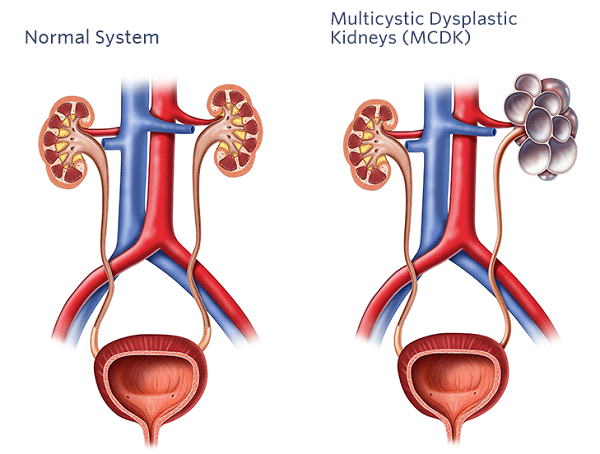Multicystic dysplastic kidney (MCDK) is a condition which affects a fetus's kidneys, and about 1 in 4,000 babies are born with MCDK. The condition occurs slightly more in boys than in girls. This condition is more commonly seen in white (Caucasian) babies. MCDK usually affects only one kidney, often on the left side.
What Is Multicystic Dysplastic Kidney?
MCDK is a kidney that has not properly developed in the uterus. Instead of developing a normal functioning kidney, a bundle of cysts form, which is like sacs filled with liquid.
MCDK can be diagnosed before birth via an ultrasound scan, although in some instances it is not detected until the child has grown. There are two classifications of MCDK - unilateral MCDK and bilateral MCDK. The former only affects one kidney, and usually causes no problems. The affected kidney eventually shrinks and the healthy kidney usually grows to perform the function of two kidneys. Bilateral MDCK is very uncommon and affects both kidneys. Unfortunately, babies without a functioning kidney are unable to survive.
How Do I Know If My Baby Has Multicystic Dysplastic Kidney?
 In many cases, children with unilateral MCDK are healthy and show no signs or symptoms. The best way to determine whether your child has MCDK is to speak with your doctor about your concerns.
In many cases, children with unilateral MCDK are healthy and show no signs or symptoms. The best way to determine whether your child has MCDK is to speak with your doctor about your concerns.
If your child has MCDK, then the affected kidney may be enlarged at birth. In very rare cases, it can lead to high blood pressure, as well as increased risk of severe kidney conditions, such as kidney cancer, kidney failure and chronic kidney disease.
What Causes Multicystic Dysplastic Kidney?
During developing in the uterus, ureters grow into the kidneys and branch out to create a network of tubules used to pass and eventually excrete urine. In the case of MCDK, the tubes have not branched out efficiently, meaning that the urine can't pass through properly, causing it to build up. This leads to the formation of cysts inside the affected kidney. Some reasons as to why this may happen are detailed below:
1. Drugs the Expectant Mother Takes
Exposure to certain drugs when a mother is pregnant, both medicinal and illicit, can cause MCDK in her child. It is extremely important to ensure that you speak with your medical provider before taking any medication if you are pregnant. And, of course, avoid the use of illicit drugs at all cost.
2. Genetic Issues
Genetic factors can play a role in causing MCDK, meaning that parents can pass it to their child because MCDK is believed to be an autosomal dormant trait. It is also possible for a baby to have genetic syndromes (groups of seemingly unrelatable conditions that stem from the same cause), which can include MCDK.
3. Urinary Tract Problems
Problems in the urinary tract can lead to MCDK. In some cases, urinary tract problems can also affect the healthy kidney and lead to total kidney failure. For instance, certain urinary birth defect can block the drainage of urine from kidney to ureter. A birth defect may cause urine to circulate back to the ureter or even kidney from the bladder. If left untreated, these urinary tract problems can affect the other healthy kidney and cause kidney failure.
How to Deal With Multicystic Dysplastic Kidney
MCDK is often diagnosed before birth, but it remains untreatable. The method of observing the kidney is currently the best practice to ensure your child remains healthy and unaffected by the condition. What's more, if only one kidney is affected, it usually shrinks and disappears, requiring no surgery whatsoever.
In some cases, your health care provider will suggest the surgical removal of the kidney. This is done via a procedure called a nephrectomy. This procedure is rarely done soon after birth. In the following circumstances, a nephrectomy will be suggested:
- If the kidney begins to grow or cause other problems, such as difficulty eating or breathing.
- If the doctor is concerned about the appearance of the affected kidney.
- If you are unable to bring your child to follow-up care regularly.
How the procedure is carried out depends on numerous factors, such as the size of the kidney, the severity of the condition and your surgeon. In most cases, recovery from the surgery is very quick and babies who have the procedure usually only stay in the hospital for one night.
